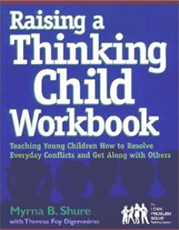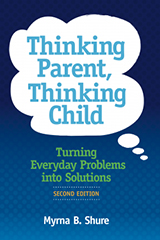Raising a Thinking Child Workbook
Help Your Young Child to Resolve Everyday Conflicts and Get Along with Others
The "I Can Problem Solve" Program
 by Myrna B. Shure, Ph.D. with Theresa Foy Digeronimo, M.ED
by Myrna B. Shure, Ph.D. with Theresa Foy Digeronimo, M.ED
Excerpt
Back to main Raising a Thinking Child Workbook page
Introduction
What do you do when your child
- won't listen to you, or do what you ask?
- hits other children, or takes away their toys?
Why do some children do well in school, and others don't?
In more than twenty-five years of working with families with young children, my research colleague George Spivack and I learned that in families of all income levels, children as young as age three or four can learn to solve everyday problems that arise with others. We also learned that children who are able to think for themselves are better adjusted than those who cannot or do not, and that good problem solvers are less likely to show aggression or withdraw socially and are more likely to develop empathy and care about others, be good leaders, and have friends.
Why is it important for young children to be good problem solvers? Because research now reveals that children who show impulsive and withdrawn behaviors, and who are having difficulty making friends, are at risk for later, more serious problems that we are all concerned about today: violence, drug use, teen pregnancy, school dropout, and some forms of psychological dysfunction, including depression.
Although telling children what to do, and even explaining why, may result in their doing what you want, often this compliance does not last. Perhaps that's because they've heard the explanations many times before and are now tuning out. Perhaps it's because we are doing the thinking for them. We all want to be free to think for ourselves. And, I have learned, so do very young children - if they have the skills and the freedom to do it.
My approach does not teach children what and what not to do and why, but rather, it teaches them how to think so they can decide for themselves what and what not to do, and why. This approach can improve behavior problems or prevent them from occurring at all. In this workbook I outline how parents can help their children learn to solve everyday problems that come up with other people by practicing a series of thinking skills from a program I call I Can Problem Solve, or ICPS.
WHO IS THIS WORKBOOK FOR?
This workbook is for parents and children to use together. Please be aware that the word parent means any adult - mom, dad, grandparent, or guardian - who wants to teach their children how to think about solving their problems. Most of the activities and games are for children aged four to seven, but children slightly younger or slightly older will enjoy them too. Some of the early games can include children even as young as two, or who have just begun to speak.
Children in many schools across the country receive training in the I Can Problem Solve curricula designed for the classroom. This workbook can help the parents of these children reinforce the classroom lessons at home. Parent educators can also use this workbook in systematic training meetings held in schools or mental health settings, and clinicians have found that the techniques in the I Can Problem Solve program offer a new approach to family therapy as well.
WHAT DOES THIS WORKBOOK DO?
- It reinforces your children's efforts to think for themselves.
- It gives you practical ways to teach your children social and emotional competencies.
- It gives you and your children many hands-on things to do that help them become (a) more empathetic, (b) better, able to cope with frustration and disappointment, and (c) better problem solvers.
- It gives you a place to record how your children are progressing in problem-solving skills and behavior.
- It gives you many ways to practice problem-solving talk with your children.
- It helps you keep track of your own progress as an ICPS parent.
Parts of the Workbook
You'll see that the workbook is divided into two parts, parent/child problems and child/child problems.
- Typical parent/child problems include:
- child won't clean her room
- child jumps on the furniture
- child interrupts you while you're on the phone
Parent/child problems are normal in all families. This section gives you and your children practice at solving these common kinds of problems, and also less common ones that may be unique in your home.
Typical child/child problems include:
- two children fight over a toy
- one child feels left out of a play group
- one child teases or intimidates another child
BECOMING AN ICPS FAMILY
The goal of this workbook is to give you lots of ideas and opportunities to practice the I Can Problem Solve program so you can become an ICPS family. Your older children can help teach the younger ones so that everyone in the house participates. The workbook will help you guide your children to identify problems, care more about their own and others' feelings, realize that what they do has an impact on other people, and, most important, that there is more than one way to solve a problem. While you will become more sensitive to what's on your children's minds and how they are feeling, your children will become more sensitive to what is on your mind and how you are feeling too.
When you finish the workbook you'll find a certificate that declares you an official ICPS family. This is not a trite or meaningless title. ICPS families are different from other families in many ways. In ICPS families
children learn how to think, not what to think.
children learn to think through a problem, so they can decide on a solution in light of its impact on themselves and others.
children are empowered with skills that enable them to negotiate more success fully for what they want, and to cope with the frustration when they can't have what they wa nt.
parents are empowered with skills that enable them to help their children become effective problem solvers.
children grow up to be thinking and feeling human beings who behave not out of fear of punishment but out of a genuine desire to not want to hurt themselves or others.


